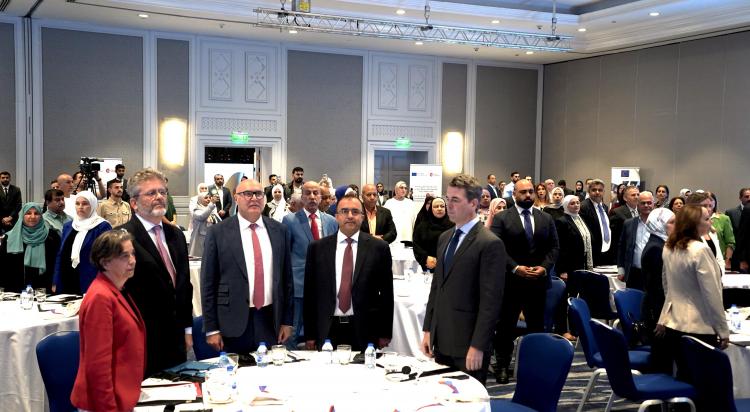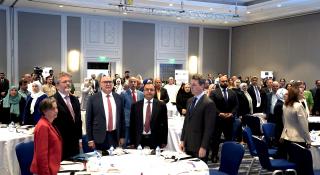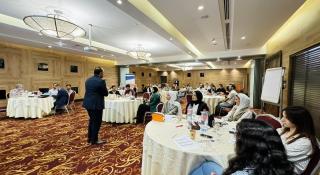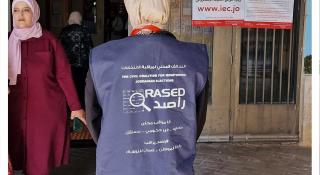المؤتمر الوطني: رؤية التحديث الاقتصادي: شراكة من أجل أردن المستقبل National Dialogue: Economic Modernization Vision-Partnership for Jordan’s Future

وزير الدولة للشؤون الاقتصادية: الحكومة تعكف على إعداد البرنامج التنفيذي الثاني لرؤية التحديث الاقتصادي (2026-2029)
السفير الاسباني: الرؤية الاقتصادية عنصر أساسي لبناء مستقبل أقوى للأردن
آدم جانسن: استقرار الأردن وازدهاره هو أولوية أوروبية
بني عامر: التحديث الشامل يتطلب دوراً فاعلاً للمجتمع المدني.
افتتح وزير دولة للشؤون الاقتصادية السيد مهند شحادة مندوباً عن دولة رئيس الوزراء الدكتور جعفر حسان مؤتمر "رؤية التحديث الاقتصادي: شراكة من أجل أردن المستقبل"، الذي عقده مركز الحياة-راصد، في إطار مشروع "نزاهة: دعم الاتحاد الأوروبي للمساءلة المجتمعية وتمكين المجتمع المدني من تحقيق الحوكمة الرشيدة"، والممول تمويل مشترك من قبل الإتحاد الأوروبي والوكالة الإسبانية للتعاون الدولي من أجل التنمية (AECID)، والمُنفذ من قبل مركز الحياة - راصد ومنظمة رشيد للشفافية الدولية.
وذلك بحضور عدد من الوزراء والأعيان والنواب، والمدراء العاميين، وممثلي مؤسسات المجتمع المدني والمؤسسات الدولية، وعدد من النخب السياسية والحزبية والأكاديمية والنسائية والشبابية من مختلف القطاعات والمحافظات، حيث يأتي هذا اللقاء انسجامًا مع رؤية الدولة الأردنية في التحديث الشامل، المتمثل في تحديث المنظومات السياسية والاقتصادية والإدارية.
وقال وزير دولة للشؤون الاقتصادية مهند شحادة خلال كلمته في حفل الافتتاح إن الحكومة تعكف على إعداد البرنامج التنفيذي الثاني لرؤية التحديث الاقتصادي (2026-2029)، وأشار شحادة إلى أن هذه الجهود لن تكون ناجحة إلا عبر تشاركية حقيقية مع القطاع الخاص ومؤسسات المجتمع المدني، لافتاً إلى أن هذه الرؤية ليست خطة حكومية فقط، بل مشروع وطني شامل تتضافر فيه الأدوار لتحقيق مستهدفات رؤية التحديث الاقتصادي المتمثلّة بتحسين المؤشرات الاقتصادية بما ينعكس على جودة حياة المواطنين.
وأكد شحادة أنه لا يمكن للحكومة وحدها أن تحقق رؤية التحديث الاقتصادي، دون تفاعل وشراكة جميع الأطراف، مشددًا على أن الأردن قويٌ بمؤسساته، وشاباته وشبابه، وأكثر قدرة على تجاوز التحديات بفضل قيادته الحكيمة.
من جهته وزير الاتصال الحكومي والناطق الرسمي باسم الحكومة الدكتور محمد المومني خلال جلسة حوارية أشار إلى أن الاتصال الحكومي هو أداة الدولة في بناء علاقة مستدامة مع المواطن مبنية على حقه في المعرفة والوصول للحقائق، وتعمل من خلاله على ضمان تدفق المعلومات الرسمية بوضوح، والتواصل مع المواطنين بشفافية، وحول المبادئ الأساسية التي تقوم عليها استراتيجية الاتصال الحكومي في الأردن، فقد أوضح المومني أن المبادئ تتمثل في الشفافية والإفصاح، التشاركية والاشتباك، والتكامل مع الإعلام الوطني والتفاعل مع حقه في المعرفة ومحاكاة السياسات، وأضاف المومني أن الدولة لا تستخدم الإعلام التقليدي فقط، بل تستفيد من المنصات الرقمية، ومن اللقاءات الميدانية والمنتديات الحوارية المباشرة كالذي نعقده اليوم، لضمان إيصال المعلومة في وقتها وبصيغ مناسبة.
وكشف المومني أن الحكومة بصدد إعداد برنامج تنفيذي لرؤية التحديث الاقتصادي 2026-2029، وسيتم إعداده من خلال خطة تلتقي بها الحكومة بشكل مؤسسي مكثف مع كافة القطاعات الفاعلة والمجتمع المدني في مختلف محافظات المملكة، وذلك بهدف تعزيز التشاركية وموائمة أولويات المجتمعات لتكون أساساً لبناء البرنامج التنفيذي لرؤية التحديث الاقتصادي.
وحول مواجهة التحديات الإعلامية والتضليل والمعلومات المغلوطة أوضح المومني أن الدولة تتعامل مع ذلك عبر الشفافية والرد والتوضيح، بالإضافة إلى إنشاء محتوى استباقي يوضّح الحقائق. وبيَن وجود وحدة رصد إعلامي إلكترونية تعمل 24/7. كما وأشار المومني أن تنسيق الخطاب بين مختلف الوزارات والمؤسسات يجري من خلال منظومة الإعلام الحكومي التي تضم ناطقين رسميين من كافة الوزارات. والتنسيق مع الوزراء في قرارات مجلس الوزراء. وأوضح أن هناك تنسيق للرسائل الإعلامية والسردية وتحديد أولويات الخطاب، كما ويتم وضع خطة للتعامل الإعلامي والاتصالي مع القرارات والسياسات. وبيّن المومني أن ثقة المواطن بالمعلومة الرسمية تُبنى بالاستمرارية، والشفافية، وبأن نكون على مسافة مهنية واحدة من الجميع. حيث كلما كان التواصل بلغة صادقة ومحتوى واضح، زادت الثقة بالمعلومة الرسمية.
وأكد المومني أن الشراكات ركيزة محورية في عمل الحكومة، نشتبك مع مؤسسات المجتمع المدني والقطاع الخاص وسوف نكثف من ذلك مستقبلا ونعمل على مأسسته، وبيّن المومني أن الإعلام شريك أساسي في إبراز أثر الشراكات.
بدوره سعادة السيد ميغيل دو لوكاس سفير المملكة الاسبانية لدى الأردن، شدّد على أهمية هذا الحدث وموضوعه وتوقيته. وشدّد على أن رؤية التحديث الاقتصادي تمثل ركيزة أساسية لبناء مستقبل أقوى للأردن. وسلط السفير الضوء على العلاقات الثنائية القوية وطويلة الأمد بين إسبانيا والمملكة الأردنية الهاشمية، على مدار السنوات، وفضلاً عن وجود رؤية مشتركة للتعاون المثمر في العديد من المجالات. وبيّن دو لوكاس أن مشروع نزاهة "NAZAHA" هذا يشارك الالتزام، حيث يهدف إلى تحسين المساءلة الاجتماعية وتمكين المجتمع المدني من خلال ردم الفجوة بين الحكومة والمجتمع المدني. وأشار السفير أن مخرجات هذا الحدث ستُساهم بلا شك في توضيح الطريق نحو تحقيق مستويات أعلى من المساءلة الاجتماعية والحكم الرشيد، نحو مجتمع أكثر تكاملًا وشفافية ومساءلة، ومجتمع يتساوى فيه الجميع.
من جهته السيد آدم يانسن المستشار في بعثة الإتحاد الأوروبي لدى الأردن أكد على إلتزام الاتحاد الأوروبي الثابت بمواصلة دعم التنمية الاقتصادية والسياسية في الأردن، وقال يانسن: «أن شراكة الاتحاد الأوروبي الوثيقة مع الأردن تُظهر أن استقرار الأردن وازدهاره هو أولوية أوروبية كذلك». وأوضح يانسن الدور المحوري لمنظمات المجتمع المدني في تشكيل مسار التنمية في الأردن، إذ قال "مع وجود أكثر من 5000 منظمة غير حكومية مسجلة في الأردن، فإن القطاع لا يدعم خلق فرص العمل فحسب، بل يمثل أيضًا جزءًا حيويًا من الاقتصاد الوطني، وتعمل منظمات المجتمع المدني كعمود فقري للمشاركة الديمقراطية والتنمية الاجتماعية، وتعمل كمحركات أساسية للمساءلة السياسية والشمول الاقتصادي “، في ظل سياق سياسي إقليمي وعالمي يزداد تعقيدًا، أصبحت مرونة منظمات المجتمع المدني وقدرتها على التكيف والابتكار جزءًا حاسمًا في البقاء ذي صلة وتلبية الاحتياجات المتطورة باستمرار.
بدوره مدير مركز الحياة-راصد الدكتور عامر بني عامر أوضح أن هذا اللقاء يمثل نقطة التقاء تجمع المجتمع المدني والقطاع الخاص مع الحكومة، وأكد بني عامر على أن الانفتاح الحكومي يجب أن يوازيه تعاون فعّال يساهم في بناء شراكات ذات أثر مستدام، وهذا المنهج الذي ينتهجه راصد في عمله ليكون المجتمع المدني في كافة المحافظات شريكاً أساسياً في إعداد الخطط ومراقبتها ومساءلتها، وهذا من شأنه أن يمكن المجتمع من تحقيق الحوكمة الرشيدة بشكل رئيسي، وشدد بني عامر على ضرورة أن يتم العمل بشكل تشاركي لتعزيز دور المجتمع المدني في تنفيذ مسيرة التحديث الشامل.
وسيتم تضمين مخرجات المؤتمر في ورقة سياسات بعنوان “تعزيز دور المجتمع المدني في رؤية التحديث الإقتصادي “، يصدرها مركز الحياة-راصد
National Dialogue: Economic Modernization Vision-Partnership for Jordan’s Future
Minister of Economic Affairs: Government preparing the second Executive Program of the Economic Modernization Vision (2026–2029).
Spanish Ambassador: The Economic Vision is integral to building a stronger Jordan.
Ádám Janssen: Jordan’s stability and prosperity remain a priority for the European Union.
Bani Amer: Achieving comprehensive modernization requires active civil society engagement.
Amman, Jordan – Under the patronage of His Excellency Dr. Jaafar Hassan, Prime Minister of Jordan, and on his behalf, Minister of State for Economic Affairs Mr. Muhannad Shehadeh inaugurated the national Dialogue titled “Economic Modernization Vision: A Partnership for Jordan’s Future." The event was convened by Al Hayat Center – RASED within the framework of the project “Nazaha: EU Support to Social Accountability and Empowering Civil Society for Better Governance”. The project is co-funded by the European Union and the Spanish Agency for International Development Cooperation (AECID), and implemented by Rasheed – Transparency International and Al Hayat Center- Rased.
The National Dialogue brought together ministers, senators, members of the parliament, general directors, representatives from civil society organizations and international institutions, as well as political, academic, women, and youth leaders from across all governorates who had a chance to voice their views and needs to be reflected in the reform processes and implementation of the Economic Modernization Vision.
In his keynote address, Minister Shehadeh confirmed that the Government of Jordan is in the process of developing the second Executive Program (2026–2029) of the Economic Modernization Vision. He underscored that success cannot be achieved in isolation, but through inclusive and robust partnerships with the private sector and civil society organizations. He stressed that this vision does not represent a government plan alone but constitutes a collective national project, requiring shared commitment to elevate economic indicators and, ultimately, enhance the quality of life for all Jordanians.
He reiterated that Jordan is strong because of its institutions and its youth, and that it is more capable of overcoming challenges thanks to its wise leadership.
Speaking during a dedicated panel discussion, Minister of Government Communication and official government spokesperson Dr. Mohammad Al-Momani emphasized that government communication serves as a strategic pillar for building a sustainable and transparent relationship between the Jordan and its citizens. He reiterated the importance of clear, accessible information and reaffirmed the government's commitment to a citizen-centric approach rooted in the right to knowledge and access to facts.
Dr. Momani outlined the fundamental principles guiding Jordan’s national communication strategy: transparency, proactive disclosure, engagement, alignment with national media, and inclusive policy dialogue. He noted that the government is increasingly utilizing digital platforms alongside traditional media channels, as well as direct community forums—such as this conference—to ensure timely and relevant information dissemination.
Momani revealed that preparations for the second Executive Program of the Economic Modernization Vision (2026-2029) are being carried out through a rigorous, institutionally anchored, and participatory process involving all key sectors and civil society across Jordan’s governorates. This approach seeks to align national priorities with community needs, ensuring local relevance and sustainable implementation.
In addressing the challenges posed by misinformation and media disinformation, Dr. Momani emphasized the role of proactive transparency, immediate clarification, and real-time content generation. He pointed to the establishment of a 24/7 digital media monitoring unit and highlighted the role of inter-ministerial coordination through the unified government media platform—featuring official spokespersons from each ministry. Strategic communication planning, narrative alignment, and policy messaging are all coordinated to ensure a consistent, trustworthy public voice.
“Public trust in official information is earned through continuity, credibility, and transparency,” he added. “When we communicate with honesty and clarity, we reinforce the public’s confidence in state institutions.”
Dr. Momani reaffirmed that partnerships are a central tenet of government operations. “We are deepening our engagement with civil society and the private sector and working to institutionalize these efforts,” he said. “The media remains a vital partner in showcasing the impact of these collaborations.”
His Excellency Mr. Miguel de Lucas, Ambassador of the Kingdom of Spain to Jordan, emphasized the importance of the event, its theme, and its timing. He stressed that the Economic Modernization Vision represents a fundamental pillar for building a stronger future for Jordan. The Ambassador highlighted the strong and longstanding bilateral relations between Spain and the Hashemite Kingdom of Jordan and emphasized the deep and close friendship that has developed over the years between the two countries, as well as a shared vision for fruitful cooperation across various fields. Ambassador de Lucas noted that the NAZAHA project shares this commitment, as it aims to enhance social accountability and empower civil society by bridging the gap between government institutions and civil society organizations. He remarked that the outcomes of the event would undoubtedly contribute to clarifying the path toward achieving higher levels of social accountability and good governance—working toward a more inclusive, transparent, and accountable society in which all individuals are equal.
Mr. Ádám Janssen, Counsellor at the Delegation of the European Union to Jordan, reaffirmed the EU’s steadfast commitment to continue supporting Jordan’s economic and political development. “The European Union’s close partnership with Jordan demonstrates that the stability and prosperity of Jordan are equally a priority for Europe,” said Counsellor Janssen. He highlighted the pivotal role of civil society organizations (CSOs) in shaping Jordan’s development path. “With over 5,000 registered non-governmental organizations in Jordan, the sector not only supports job creation but also represents a vital part of the national economy. CSOs serve as the backbone of democratic engagement and social development, and act as essential engines of political accountability and economic inclusion,” he noted. “In an increasingly complex political environment, the ability of CSOs to adapt and innovate has become essential to remaining relevant and meeting the ever-changing needs of the community.
In closing, Dr. Amer Bani Amer, Director of Al-Hayat Center – RASED, emphasized that the dialogue serves as a crucial convergence point for civil society, the private sector, and the government. He affirmed that genuine government openness must be matched by meaningful collaboration that builds long-lasting, impactful partnerships.
“This is the model RASED has consistently championed—where civil society across all governorates is a central partner in designing, monitoring, and holding government plans to account,” Dr. Bani Amer stated. “Such an approach empowers local communities to realize the core principles of good governance.”
The National Dialogue’s outputs, including the feedback from the attendees, will be reflected in a white paper authored by Al Hayat Center -Rased, titled Enhancing the Role of Civil Society in the Economic Modernization Vision.


